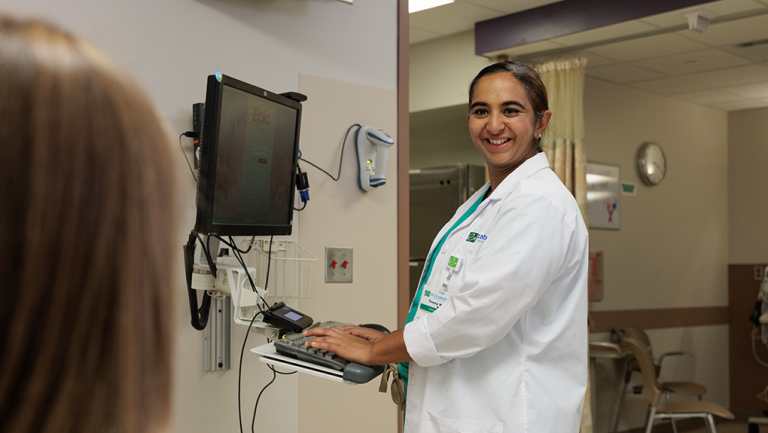Colorectal surgery can be life-changing for patients dealing with chronic digestive issues, pain or cancer. At St. Elizabeth, colorectal surgeons treat a wide range of conditions, including diverticulitis, colon cancer, hemorrhoids and anal fissures. Many of these procedures are elective, meaning they can be scheduled in advance and tailored to each patient’s needs.
Starting with a Conversation
Elective surgery doesn’t mean urgent—it means patients have time to prepare, ask questions and make informed decisions. That’s why the first step is always a conversation.
“Seeing a surgeon doesn’t mean that I’m going to operate on you,” says Teena Nerwal, MD, a Colorectal Surgeon at St. Elizabeth. “It just means I’m going to talk to you about it.”
Colorectal surgery may be recommended for patients with colon or rectal cancer, persistent anal pain or bleeding, chronic diverticulitis, large polyps that can’t be removed during a colonoscopy and hemorrhoids or fistulas that don’t respond to other treatments. Each case is different, and surgery is never a one-size-fits-all solution. Surgeons work closely with patients to determine the best course of action based on their symptoms, overall health and personal preferences.
Before and After Colorectal Surgery
Patients undergoing colorectal surgery at St. Elizabeth receive personalized care before, during and after their procedure. The care team provides detailed instructions, answers questions and helps patients feel confident about their recovery. From pre-op planning to post-op follow-ups, the goal is to make sure every patient feels supported and informed.
Many patients delay seeking care for colorectal issues due to embarrassment or fear. However, early evaluation can lead to simpler treatments and better outcomes. Conditions like hemorrhoids, fissures and chronic constipation are common and treatable, especially when addressed early.
Preparation for colorectal surgery begins well before the procedure. Patients are encouraged to follow pre-op instructions carefully, including dietary changes, medication adjustments and hydration. These steps help reduce complications and support a smoother recovery.
Recovery varies depending on the procedure, but most patients can expect to resume light activities within a few days. Walking, eating a balanced diet and staying hydrated are key to healing. The care team at St. Elizabeth provides detailed guidance and support throughout the recovery process.
Common Colorectal Surgery Myths
There are many myths about colorectal surgery. One common misconception is that surgery is always painful or requires a long hospital stay. With modern techniques like robotic-assisted surgery, many procedures are minimally invasive and allow for faster healing.
Another myth is that only older adults need colorectal care. In reality, conditions like colorectal cancer are increasingly being diagnosed in younger patients. Regular screenings and prompt attention to symptoms are important for all age groups.
Who is a Good Candidate for Colorectal Surgery?
Patients often ask if they’re good candidates for surgery. The answer depends on their overall health, the severity of their condition and their personal goals. Surgeons at St. Elizabeth work closely with each patient to create a personalized care plan that fits their needs.
Choosing colorectal surgery is a big decision, but it doesn’t have to be overwhelming. At St. Elizabeth, patients are supported every step of the way—from the first consultation to post-op recovery. The goal is to help each person feel better, live healthier and return to the activities they enjoy.
If you’ve been living with digestive discomfort or delaying care, it may be time to start the conversation. To schedule a consultation, contact the colorectal surgery team at (859) 578-5880 or visit our Surgery page to learn more.

